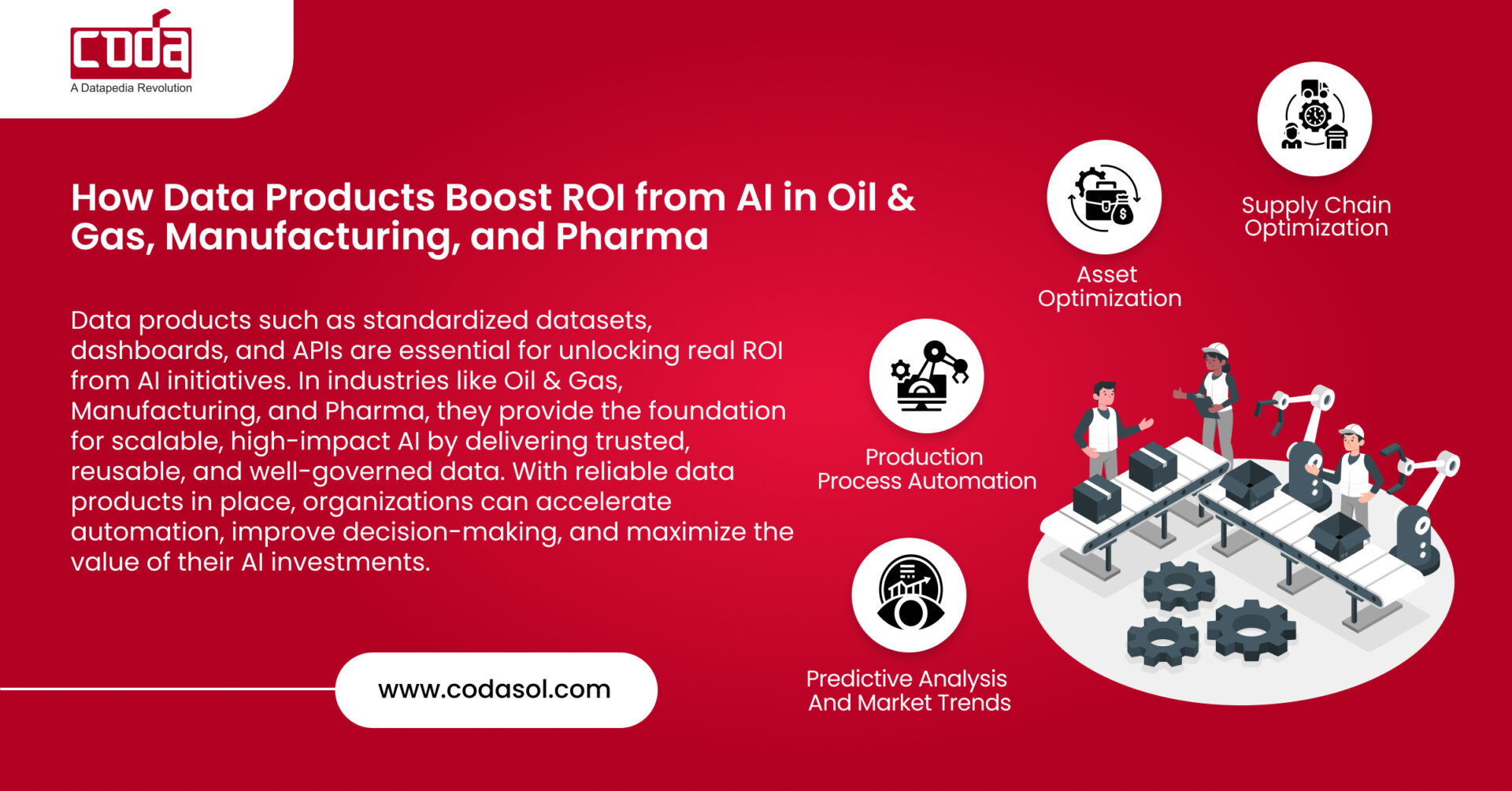Industries like oil and gas, manufacturing, and pharmaceuticals treat data as valuable assets. For these sectors, adopting AI can transform raw data into actionable insights, streamline operations, detect errors, and provide the flexibility to scale. AI-driven solutions help industries gain real-time insights, leading to sound decision-making and, ultimately, higher return on investment (ROI).
In this blog post, we’ll explore how AI can maximize revenue in these industries by driving efficiency and reducing costs.
Predictive Maintenance and Asset Optimization
One of the most powerful applications of AI is predictive maintenance, especially for industries reliant on expensive machinery, such as oil rigs, manufacturing lines, or pharmaceutical production equipment. AI systems analyze historical data to predict when a machine is likely to fail. This early warning allows companies to take preventive action, avoiding costly downtime and repairs. For example, AI can monitor the performance of drilling rigs and pipelines to detect subtle issues long before a breakdown occurs.
In manufacturing, AI acts as a quality controller, ensuring product consistency and detecting defects. By identifying issues that might go unnoticed during human inspections, AI helps reduce rework, save time, and lower operational costs. These improvements often translate into a 10-25% increase in ROI, thanks to the extended lifespan of assets and reduced downtime.
Supply Chain Optimization
AI technology also enhances supply chain efficiency. Industries can optimize production and streamline logistics by analyzing data in real time. Studies suggest that companies using AI-enhanced supply chains see a 5-20% improvement in production efficiency and cost savings. AI helps companies fine-tune inventory management, ensuring the right products are available at the right time, minimizing stockouts, and reducing excess inventory.
AI tools can forecast demand more accurately, improving decisions related to import and export routes, transportation, and overall logistics management. These optimizations reduce lead times, minimize wastage, and significantly cut costs.
Production Process Automation
AI-powered tools, like digital twins and the Internet of Things (IoT), are revolutionizing production processes. These technologies give industries—especially manufacturing and pharmaceuticals—real-time insights to automate their operations. Whether it’s optimizing chemical processes or improving the efficiency of laboratory equipment, automation minimizes downtime and enhances productivity.
For pharmaceutical companies, AI contributes significantly to drug discovery and development by speeding up research and analysis. In manufacturing, AI ensures smooth production by adjusting processes in real-time based on sensor data, improving overall efficiency.
Predictive Analysis and Market Trends
Predictive analytics, driven by AI, is another powerful tool for industries. Whether it’s predicting oil exploration outcomes, optimizing inventory levels, or forecasting drug launch success, AI can identify trends and patterns that traditional methods often miss. These insights enable companies to respond more effectively to market demands.
By leveraging predictive analysis, industries can achieve a 5-20% boost in ROI. AI-powered predictions provide a competitive edge, helping businesses make informed decisions about future investments, supply chain strategies, and resource allocation.
Regulatory Compliance and Safety Measures
AI also plays a vital role in ensuring regulatory compliance and safety. By analyzing past records, AI systems can identify potential risks, predict non-compliance issues, and ensure adherence to strict regulations like GDPR and HIPAA. This is especially important in industries like oil & gas, where failure to comply can result in hefty fines and reputational damage.
AI-driven solutions can also detect fraudulent activities such as data breaches or unauthorized access, providing an extra layer of security in an increasingly data-sensitive world. This helps industries maintain trust and reduce the risks associated with data governance.
Challenges Facing AI Adoption in Industries
While the benefits of AI are vast, implementing AI technology in industries can be challenging. Many companies face obstacles that prevent them from realizing AI’s full potential, often due to poor data management. Below are some common data challenges that industries encounter when adopting AI initiatives:
Outdated Data
Data that no longer reflects current trends or behavior can hinder AI performance. For example, in industries like oil & gas or pharmaceuticals, using outdated data from exploration reports or clinical trials can lead to inaccurate predictions. This reduces the effectiveness of AI systems.
Inconsistent Data
Data inconsistencies—such as missing values, duplicates, or irrelevant information—pose a significant challenge for AI. Poor-quality data disrupts the entire data lifecycle and leads to faulty predictions, ultimately affecting the company’s decision-making process.
Data Silos
Data silos occur when information is stored in isolated systems, making it difficult for AI to access the full range of data required for accurate analysis. In industries like manufacturing, where various departments use different software systems, this can be a major barrier to effective AI adoption.
Cross-Border Data Restrictions
When companies operate across multiple regions, they must comply with different data privacy regulations. Cross-border data restrictions can complicate global data transfer and hinder AI’s ability to provide a unified analysis across different jurisdictions. Managing these restrictions requires careful planning and strict adherence to local laws.
Data Accountability
The vast amount of data coming from multiple sources can make it difficult to determine data ownership. Without clear guidelines, AI systems struggle to address issues related to data stewardship, leading to accountability challenges that further complicate AI initiatives.
Overcoming Data Challenges in AI
Fortunately, there are several strategies industries can adopt to overcome these data challenges and maximize the potential of AI.
Data Validation
Implementing robust data validation rules ensures that only accurate, relevant data is entered into the system. This helps AI make better predictions and reduces the risk of incorrect analysis due to poor data quality.
Data Governance
Establishing a comprehensive data governance framework can resolve many data issues, such as inconsistencies, data silos, and accountability. By assigning data stewards to oversee data quality and management, industries can ensure that their data is well-organized, reliable, and accessible.
Cloud Solutions
Partnering with multi-cloud providers offers scalability and flexibility to handle vast amounts of data, particularly in sectors like oil & gas or pharmaceuticals where data from exploration and clinical trials is constantly generated. Cloud solutions provide efficient storage and easy access, allowing AI to focus on valuable data.
Automated Data Labeling
Using AI-driven tools to automate the process of data labeling and categorization can significantly reduce manual errors. This is particularly useful in industries like manufacturing, where machine data needs to be labeled for predictive maintenance purposes.
Data Interoperability Standards
Establishing industry-specific data interoperability standards, such as ISO in manufacturing or CDISC in pharmaceuticals, helps break down data silos and promotes seamless data integration across different systems.
Ethical AI Frameworks
Finally, to avoid data bias and ensure fairness, industries should implement ethical AI frameworks. These frameworks guide how data is collected, processed, and labeled, reducing the risk of biased outcomes and ensuring that AI operates ethically.
Final Thoughts
Industries like oil & gas, manufacturing, and pharmaceuticals stand to gain significantly from AI adoption, particularly when it comes to maximizing ROI from their data products. However, AI implementation is not without its challenges, particularly when dealing with data quality issues. By addressing these challenges head-on and implementing best practices, industries can unlock the full potential of AI and drive meaningful improvements in efficiency, compliance, and revenue.
To learn more about how AI and data management can transform your business, read our blog post on the importance of AI and ML in data management here.
Contact Us
Ready to explore how AI can boost your ROI? Contact us today to discuss how we can help you implement AI-powered data solutions.

